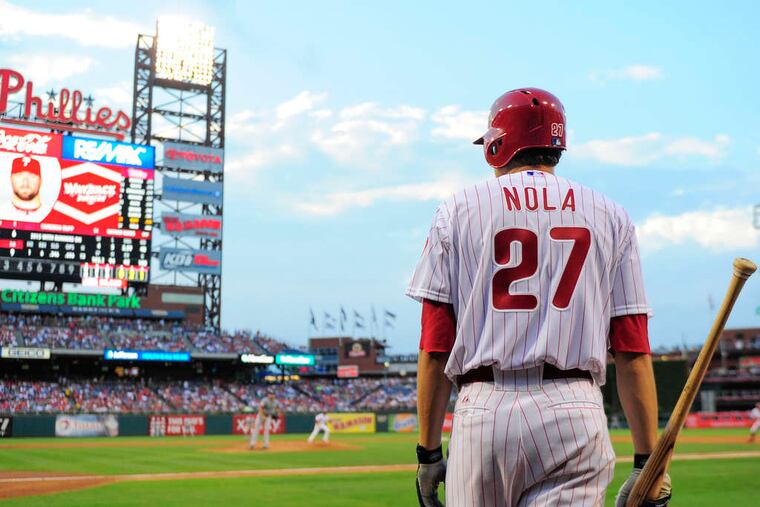COVID-19 accelerating changes that will be part of baseball forever | Bob Brookover
Baseball is going to hold a virus-shortened regular season that could lead to the longest postseason in the game’s history, and the days of no designated hitter in the National League are likely over.

The coronavirus has changed everything and it is about to change baseball forever.
Sure, it was a foregone conclusion that COVID-19 would take a huge chunk out of the 2020 season. We knew that when spring training was shut down in March amid the growing concern that the virus was spreading around the globe with the United States as a primary target.
We did not know, however, that baseball would use the pandemic to accelerate ideas that were coming in the near future anyway.
If the players union approves the plan pushed in front of it Monday, we will see only 82 regular-season games, with the Phillies playing games within their own division and against American League East teams. They had been scheduled to play the majority of their interleague games this season against the American League West.
What we will likely also see now is a longer postseason with the playoff fields in each league expanding from 10 to 14 teams for the first time in history. That means nearly half the teams will make the playoffs in this virus-shortened season. That means MLB is now just like the NHL and the NBA.
Is that good or bad?
It’s good for the game’s bottom line, of course, because more playoff games mean more revenue. It will likely only be television revenue this season unless fans are allowed back in the ballpark by October. That scenario seems unlikely unless a vaccine arrives way ahead of schedule.
The playoff proposal revealed by the New York Post’s Joel Sherman in February would be a made-for-TV event, starting with an NCAA-like selection Sunday on the final evening of the regular season.
Using last year’s National League standings as an example, it would work something like this: As the team with the league’s best record, the Los Angeles Dodgers would receive a first-round bye. Atlanta, the division winner with the second-best record, would decide which of the bottom three wild-card teams it would most like to play in a best-of-three series with all three games being played on the Braves’ home field.
The other division winner, which was St. Louis last season, and Washington, which was the top wild card, would also get to play all three of its first-round playoff games at home.
Based on last season’s standings, the three bottom wild-card teams would have been Milwaukee, the New York Mets, and Arizona. If the Braves chose to play Arizona and St. Louis opted to play the Mets, it would leave Washington going against Milwaukee.
The owners believe this format will create more interest among the fans and the TV networks and maybe they’re right. Phillies managing partner John Middleton told me in spring training that he loved the idea of teams picking their opponents.
» HELP US REPORT: Are you a health care worker, medical provider, government worker, patient, frontline worker or other expert? We want to hear from you.
We probably were not going to see that format until after the current collective bargaining agreement expired following next season, but this seems like as good a time as any to give the expanded postseason a test run. Baseball fans are being deprived of half the season, so why not give them more postseason?
This is a guarantee: The 14-team playoff system is here to stay.
The designated hitter is also about to become a universal rule forever. The DH was coming in 2022 after being part of only the American League for the last 47 years. It is amazing to think the two leagues have played by different rules for nearly half a century, and there will be a lot of people who will miss the strategy created by having a pitcher hit.
Count me among the traditionalists who will be sad to see the arrival of the DH. I loved it when managers had to decide whether to lift their pitcher for a pinch-hitter in the late innings of a close game and I loved it even more when a pitcher was a good hitter. Admittedly, good-hitting pitchers had become an endangered species.
“There are going to be a lot of things that are different,” Phillies special adviser Larry Bowa said. “I’ve always been against the DH, but you don’t want to see pitchers getting hurt running the bases or sliding. I get that part of it. I’ll miss the strategy, but a lot of that is gone from the game already anyway. You don’t see guys stealing bases or squeezes or any of that stuff much anymore.”
It’s possible it could take the players union at least a few days or maybe even weeks to approve the owners’ proposal, but the sticking point is not going to be the expanded playoffs or the addition of the DH to the NL. The players love both those ideas.
They will not be nearly as fond of the reported proposal that will give them 50% of revenues rather than the prorated portion of their negotiated salaries.
It is hard to imagine that the owners and players could not come to some sort of a financial agreement if they get the green light to play from federal and state officials. At a time when the unemployment rate has climbed to nearly 15% that would be just plain stupid.
On the other hand, baseball owners and players are notorious for doing dumb things for the sake of money. Failing to make a deal here, however, would be even worse than the 1994 labor strife that forced the cancellation of the World Series.
“I just want to see baseball again,” Bowa said.
On that, we can all agree.